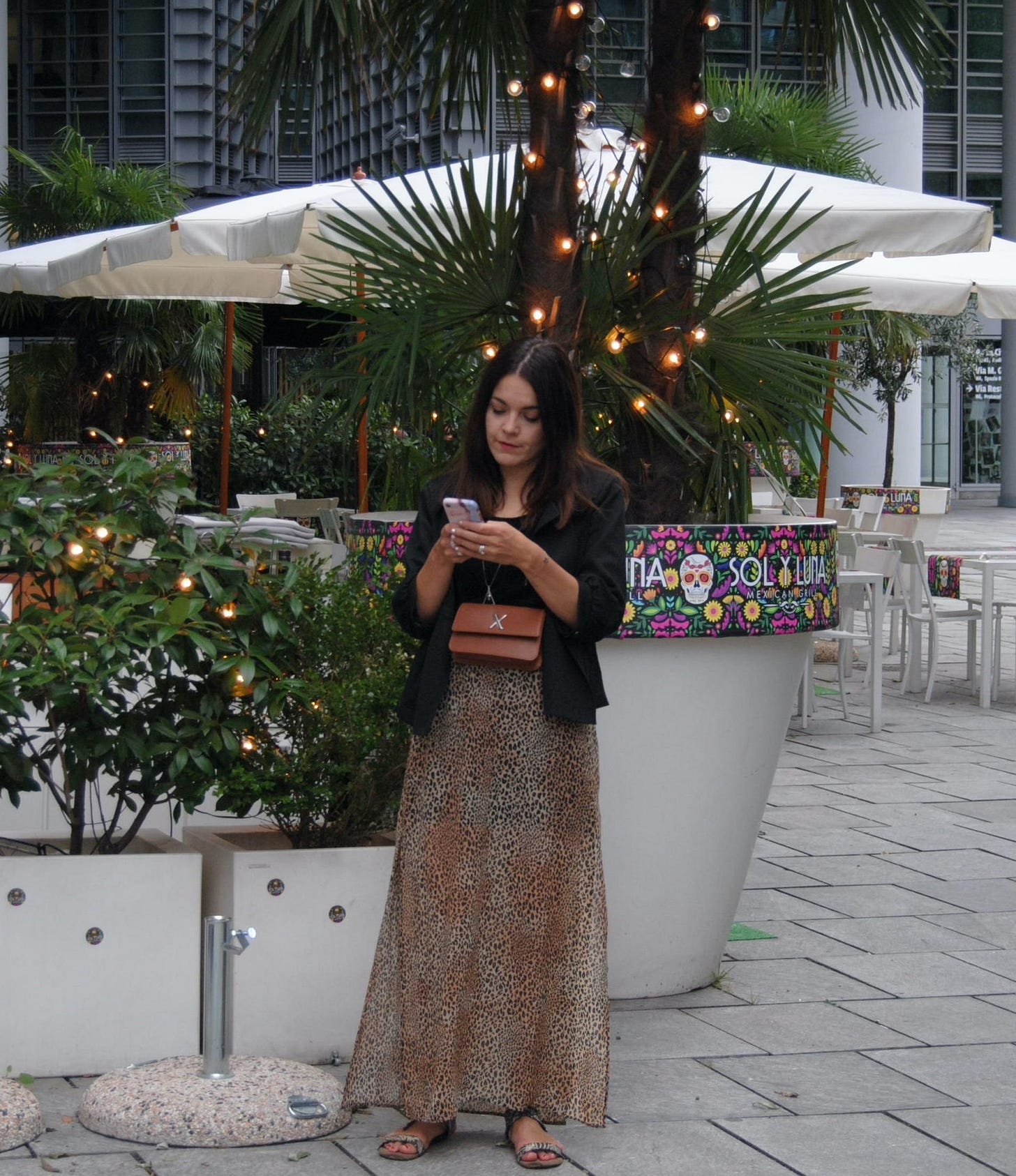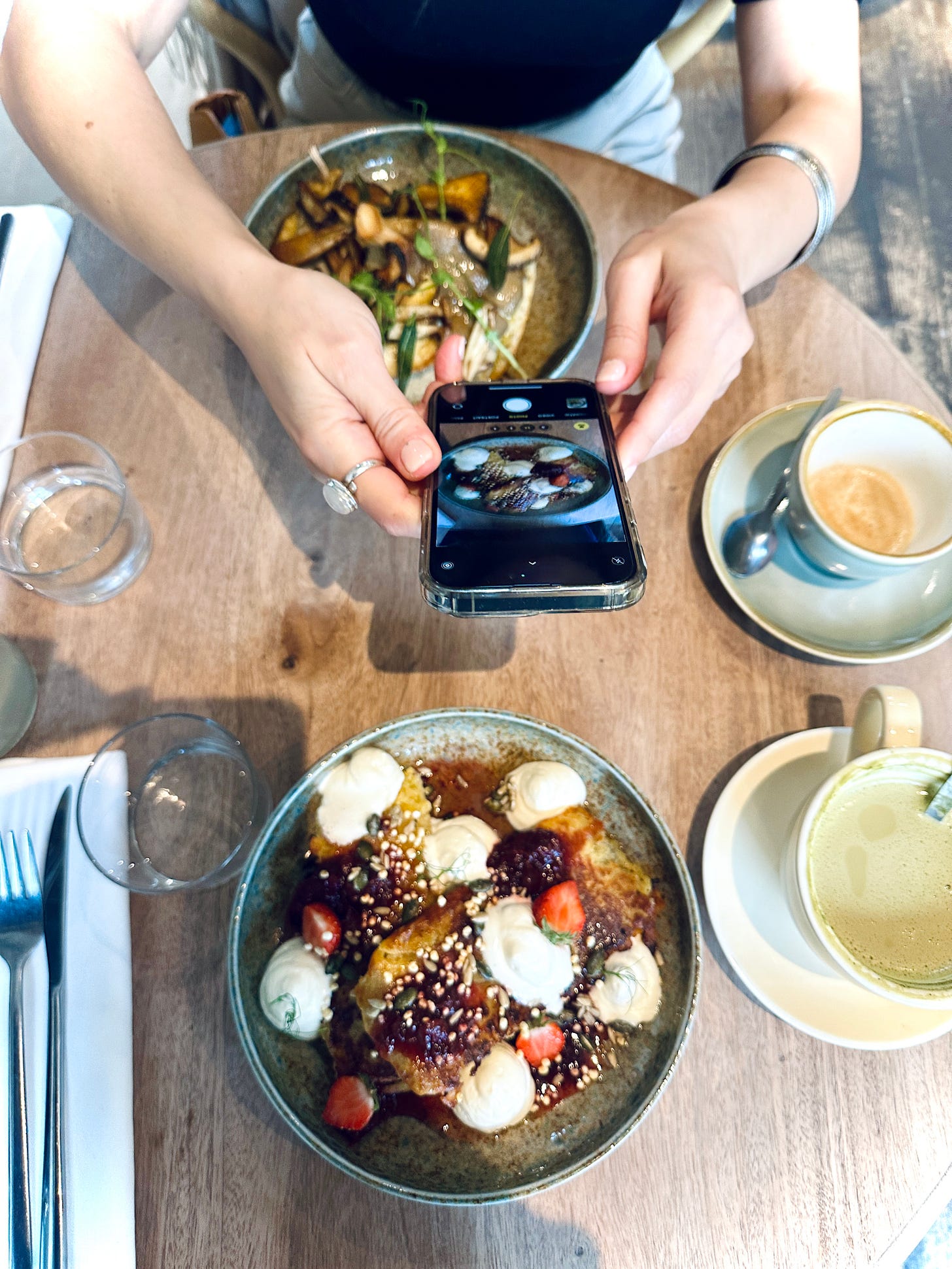Little note: I started writing this post long before this week. But with all that’s been happening in the world, I’ll be even more offline right now.
“Where is it?”
I pat my pockets anxiously. They are scarily flat and empty. Nothing. I check my bag, my fingers itching to feel that familiar rectangular shape. Where did I put it?
I look over at my husband, who’s chatting calmly to our friends. I tap him on the shoulder. “Do you have my phone?” I ask while bubbles of fear rise within me. “I think I lost it.”
It’s the summer of 2022, and I’m visiting a festival as a speaker. I’m in the midst of a huge field littered with tents. I’ve just finished my talk, and there are great vibes all around, except for one little detail: my phone is nowhere to be found.
But my worry is shockingly short-lived. While I half-walk, half-run back towards the stage where I was speaking, the avalanches of anxiety slowly subside, and a different thought takes hold: what if I were never to find my phone and…not replace it? What if it were gone forever?
My gut reaction? Relief.
Spoiler alert: my phone was quickly located at the stage where I had given my talk. But as it was dropped back into my hands, a tiny part of me mourned the possibility of a phone-free future. Which, of course, was not a possibility at all, in today’s society. But the what if was dizzying enough in itself.
I did my first digital detox in 2018, documenting it for the online magazine I ran back then. Prior to that, I’d been vocally opposed to digital detoxes. I was in the habit of saying things like, “it’s not social media’s fault if your relationships suffer, it’s YOUR fault!”. But during my five days offline, I learned so much about myself, the person I wanted to be, and the person I didn’t. I still remember sitting in a pizzeria and a friend commenting, “wow, Sascha - it’s so strange to see you just eating the food without photographing it.” I thought of that three days ago, when I had an amazing brunch and…spent several minutes photographing it. Was I backsliding?
“But you’re doing something useful,” said one of my best friends during my digital detox. “You’re promoting vegan living, helping people find vegan food and fashion. You’re not just showing off.” And that’s the story I’ve been sticking with for years: I’m not just an average social media user. In fact, I’m hardly even on it for my own enjoyment at all. I’m an online activist. I’m spreading a message. Clocking up a sky-high screen time is just something I do for a better world. I kept telling myself that while continuing to scroll.
Without a doubt, social media can be an incredibly useful tool when it comes to campaigning for the world we want - and more people are using it for that very purpose. A survey by the Pew Center has found that one-third of social media users participate in groups which share an interest in a cause. After the death of George Floyd in 2020, we truly learned about the impact of social media on social justice: the hashtag #BlackLivesMatter was used 48 million times between 26 May and 7 June 2020, prompting a worldwide movement and countless IRL protests (several of which I went to, after having learned about them online).
However, for all the potential it has, there is also no denying - and lots of social media quitters here on Substack will attest to this - that our digital-first lifestyle is wreaking havoc on our mental health. Anxiety, depression, and memory issues are just a few problems that an excessive use of the apps can bring. Comparison also takes hold, and it goes much deeper than beauty filters and the like. It seeps into our very being. I remember following someone I know who was going on a solo bicycle trip, and feeling so immensely jealous. I berated myself for not being as “adventurous” as my friend. It wasn’t until I logged out that it dawned on me that…I can’t ride a bicycle. I hate bike helmets passionately. I can’t put up a tent, and the idea of being by myself for more than a day fills me with dread. I would have been miserable on her trip. I was much happier where I was in that moment - sipping cocktails on the beach in Cyprus with my husband. In just a few scrolls, I’d forgotten who I was, and stopped appreciating what I had.
People around me echo this. My sister told me recently: “I’m a mother and I often compare myself to other mothers online. I think of how my body looks, my home. How often I exercise and how much I travel. I think that social media prompts me to look to other people and their lives instead of gazing inwards and realising that I’m actually very happy with my body, my home, and my life.” To me this is spot on - one of the biggest perils with social media in my own experience is that it makes me lose myself. And it’s incredible how quickly I find myself again once I log off.
But also, the fact is that I just don’t like social media as much as I once did. In her post Goodbye Instagram, one of my favourite Substack writers Emma Gannon talks about, well, leaving Instagram. This sentence she wrote really stuck with me: I like reading. I don’t like reels or three-second videos. It fries my brain. At the risk of sounding like the geriatric Millennial that I am, I feel exactly the same - and I’m painfully aware of how social media dynamics have changed since my 2018 digital detox. Back then, reels did not exist. TikTok wasn’t around. To me, there is nothing relaxing about spending half an hour scrolling a long line of ten-second videos. It makes me anxious and, well, anxious is the opposite of relaxed. And it’s not actually relaxing; just numbing. I’d rather read. Not to sound all intellectual, I’d probably be reading ELLE. But it beats scrolling. Every time.
So, what gives? Some of us may resolve to log out for good - but going cold turkey doesn’t seem to be very simple. In 2021, Pamela Anderson announced she was quitting social media - with a vow to return to a life she was “genuinely inspired by, reading and being in nature.” I remember the countless comments under her post, all along the lines of “wow, that’s my dream”. I was thinking, “just delete your accounts then, if it’s your dream”. But it’s not that easy. Slate writer Shannon Palus is one of those who have tried to quit, but ultimately let go of the ambition: “These platforms are just part of the fabric of how we interact with the world now, even if they can also serve to make us feel distracted, dull, and generally worse.” Today, Anderson is back on Instagram, and it’s safe to say that many of her followers never left it. It could be argued that Anderson’s endeavours to promote her Netflix documentary, her skincare brand, her cookbook, and other ventures is part of what prompted her to rekindle her relationship with the platforms - and this could, albeit on a different scale, be true for non-famous creatives too. One of my main traffic drivers to this Substack is…Instagram. And that is one of the reasons why I won’t completely quit it.
I’ve started a new rule for my own social media use: every time I pick up my phone to go on social media, I ask myself about my reason for logging on. If it’s to post something, or to look at something in particular, that’s fine. But if it’s just to “have a scroll”, I put my phone back down. Same with second-hand shopping apps - if I go on them to search for a specific purchase, I allow myself to do it, but if it’s “to have a look at what’s there”, then I force myself to put it away. And it’s working: over the last two weeks, my screen time has gone down from nearly five hours to a bit over two (this is just my phone - I clock in many more hours working on my laptop and watching Netflix on my iPad). The mental clarity that has resulted from this is astonishing. I feel less pulled in different directions, less anxious, and less like I “should” be living my life in some different way. But most importantly, I feel more like myself again. So if you’re contemplating a gentle uncoupling: do it. There is so much to gain here. Especially right now - with the world going even more insane, the last thing you need is a million voices in your head, all shouting about it. Shut them out, and take some time to listen to the one voice that matters: your own.
Top photo by David Camilli. Second photo by me.






Yes! to all of this! It's a love-hate relationship for me. I think the key is to treat it like a job, a work task. It's not a reflection of how I feel or who I am. It's a part of me, but it's not the entirety. As far as endlessly scrolling and memory loss -ugh, yes to this too. I could definitely use more time playing my ukulele. reading anything and less time scrolling.
I really need to take a leaf out of your book. Scrolling is definitely numbing and frying - but I think we are so used to using it precisely to numb, because it's a quick bit of short term dopamine. And it's so accessible - when I'm in need of a 5 minute break at work I can't really pull out a book in front of all my colleagues, but a quick scroll seems acceptable. The long term cost definitely isn't worth it though - thanks for the nudge!